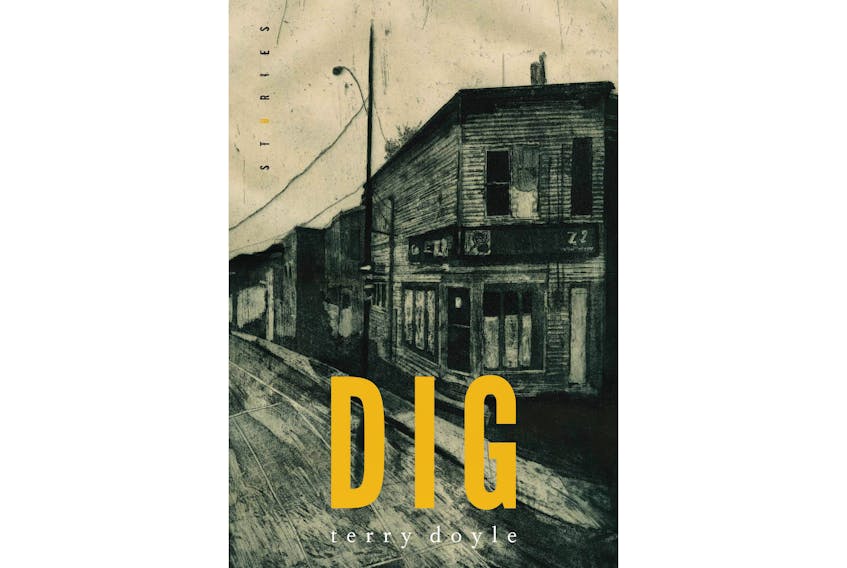
Literature from Newfoundland and Labrador has been punching above its weight in the national arena for half a generation now (Lisa Moore, Michael Winter, Wayne Johnson, Elisabeth de Mariaffi, Michael Crummey).
Equally impressive to me are how strong recent new writers are, right out of the gate (Megan Coles, Matthew Hollett, Eva Crocker, Katie Vatour). I always have to doublecheck that their novels, volumes of poetry, or short story collections are indeed debuts.
Please add Terry Doyle to this list.
“Dig” contains a dozen short stories linked by geography and circumstance, a milieu of piecemeal construction work, basement apartments, physical and emotional vulnerability, a little too much partying.
Characters are often engaged in navigations or negotiations. In “Kid’s Special,” Kingsley’s family has relocated for his father’s new employment, which means a different house and a new school. How to fit in? A promising first step seems to be picking the best off-site lunch spot. “Turned out there were plenty of lunchtime options surrounding the school. There was Betty’s Golden Foods, which served deep-fried chicken and chips — the Kid’s Special was two dollars, three with a can of pop. There was a pizza/ice-cream parlour called Dino’s where most of what I considered the tough-looking kids are. There was a franchised fried-chicken place, for kids who’d been given too much lunch money and hadn’t yet picked up smoking. And there was a butcher shop that sold sub sandwiches, and loose, microwaved Pizza Pockets for a dollar.”
Most of the protagonists are older than middle-school Kingsley, though still young, and most are men. One exception is Riley in “Graceland.” Riley is engaged in social activism, such as protesting the animal cruelty of a cow left outside in a snowstorm, and becoming more influenced by Cheryl, a lawyer and SPCA volunteer. Riley’s dad is off work, his leg crushed by a pallet-load of baby wipes, and is selling puppies from their apartment. The litters aren’t mistreated but there’s still something heartbreaking about it.
“Then, last Sunday, after a lunch meeting to discuss strategy for a protest against the province’s new tax on books — books! — Cheryl took Riley back to her house on Carpasian Road before driving her home. Standing in the porch, waiting for Cheryl to deactivate the alarm, Riley’s eyes wandered, taking in the extravagance: the fresh-cut flowers in some magnificent vase, the oil paintings in thick, blonde frames, the rug, the vaulted ceilings, and the two Persian cats who stared judgingly from atop the winding staircase.”
Brooks, in the titular “Dig,” has travelled from Regina to St. John’s for a conference, and meets Billie, brash and alluring. She sweet-talks her way into a complimentary boat tour, for example. Is she somehow using Brooks? He isn’t sure, and isn’t sure he cares, as he repeatedly, expensively and clandestinely postpones his flight home.
There’s a lot of ambiguity in these stories, especially the endings, which are perfectly pitched and timed. Which is all the more intriguing because the stakes in all the stories are very high. Will Kingsley make friends? Riley’s at some pivotal point in her relationship with her father, with all kinds of dignity, responsibility, and compassion on the table. As for Brooks, he is in it up to the hilt for this mystifying woman.
In “Cul-de-Sac,” Charles is back from a post-fire Fort Mac. “I still had a few dollars in my bank account. It was a job to spend it all while working. But once I got back, once I bought the plane ticket, gave my cousin two grand for his old Corolla, and paid first and last month’s rent for a one-bedroom in Rabbittown, there grew a monetary vacuum. Food cost more here. Gas cost more. Taxes were higher. Even gear — which I’d recently developed a taste for — was more expensive.”
None of the characters have much of a cushion, and some push any protective envelope with drink and drugs. But they are also connected to others, some even in love. In “Keeping That, Are you?” (excellent title), Ryan runs his own one-man business, carting stuff (i.e. an ex-husband’s belongings) to the dump, salvaging items for a Sunday flea market, quietly slipping the profits to his partner, Tina. When he was let go from his construction job she said, “You’ll figure something out.” At her request he will skip the market, forgoing the table fee, to do a favour for her sister. At night Tina’s “hand slipped under Ryan’s shirt. He could feel her breath in the darkness, softly moving the hair poking out of his collar. She was asleep in seconds.” “Dig” is assured, page-turning writing that is all about excavating what’s under the seemingly ordinary surface.
Joan Sullivan is editor of Newfoundland Quarterly magazine. She reviews both fiction and non-fiction for The Telegram.
RELATED:









